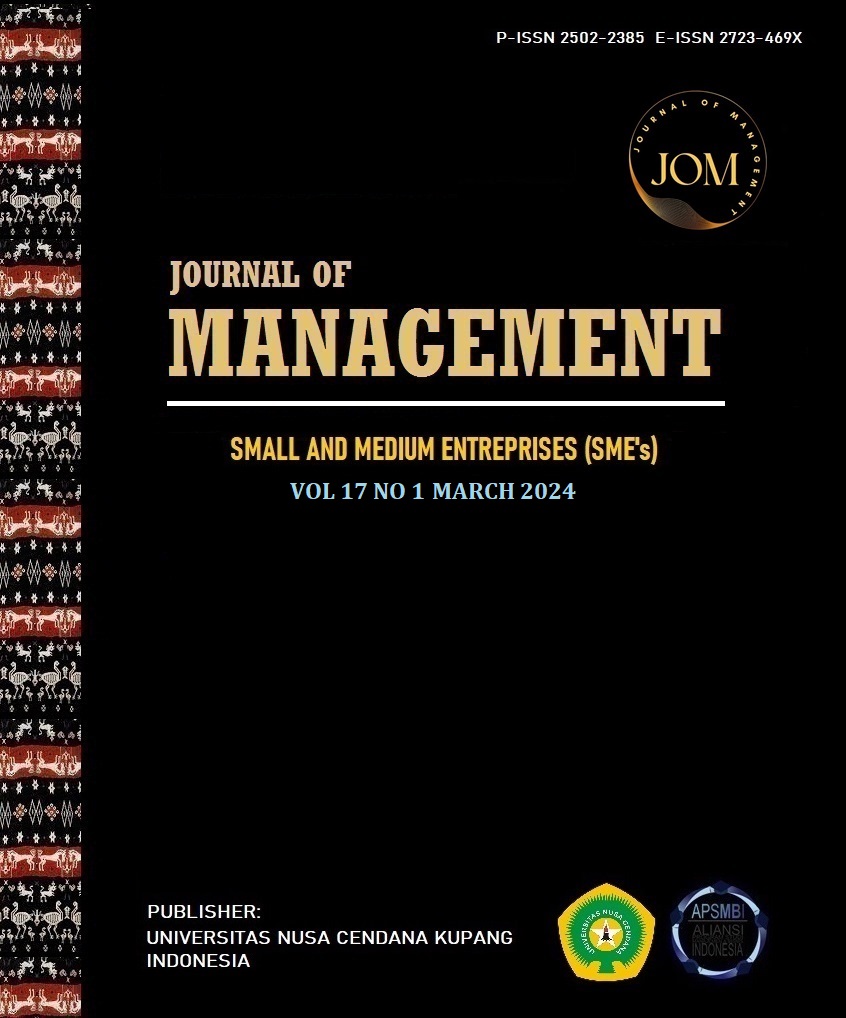PENGARUH PENGGUNAAN TEKNOLOGI DALAM PEMASARAN PARIWISATA SELAMA MASA PANDEMI COVID-19 DI INDONESIA
Abstract
Technology has an important role to play in advancing sustainable tourism destinations. The purpose of this study is to determine the effect of technology on tourism marketing during the COVID-19 pandemic in Indonesia which can be used as material for decisions by tourism practitioners and is useful for researchers in the tourism sector. This research was conducted using a systematic literature review (SLR) of 2 reference articles from Scopus. The results show that there is no antecedents from tourism marketing that were studied during the COVID-19 pandemic. In addition, there is a positive influence of technology on tourism marketing during the COVID-19 pandemic. There are several consequences of technology adoption in tourism marketing, namely image, trust, visitors' interest and tourist behavior. However, this research still has limitations on the reference sources used (only Scopus), it is recommended to add a database for future researchers and add other research problem formulations.
Keywords: Technology ; Tourism Marketing ; COVID-19 pandemic
Downloads
References
Buttussi, F., & Chittaro, L. (2023). Acquisition and retention of spatial knowledge through virtual reality experiences: Effects of VR setup and locomotion technique. International Journal of Human Computer Studies, 177(May), 103067. https://doi.org/10.1016/j.ijhcs.2023.103067
Carroll, L. S. L. (2017). A comprehensive definition of technology from an ethological perspective. Social Sciences, 6(4). https://doi.org/10.3390/socsci6040126
Darmawati, D., Hardiana, D., Mainata, D., & Nuryadin, M. B. (2023). Halal Industry: A literature Bibliometric Review on Halal Studies. Mazahib, 22(1), 175–211.
Dolnicar, S. (2005). Understanding barriers to leisure travel: Tourist fears as a marketing basis. Journal of Vacation Marketing, 11(3), 197–208.
https://doi.org/10.1177/1356766705055706.
Gnoth, J. (2002). Leveraging export brands through a tourism destination brand. Journal of brand management, 9(4), 262-280. Journal of Brand Management, 9(4), 262–280.
Gulbahar, M. O., & Yildirim, F. (2015). Marketing efforts related to social media channels and mobile application usage in tourism: Case study in Istanbul. Procedia-Social and Behavioral Sciences, 195, 453–462.
Han, D.-I. D., Weber, J., Bastiaansen, M., Mitas, O., & Lub, X. (2019). Virtual and augmented reality technologies to enhance the visitor experience in cultural tourism. Augmented Reality and Virtual Reality: The Power of AR and VR for Business, 113–128.
ILO. (2021). World employment and social outlook: The role of digital labour the world of work. In World employment and social outlook: Trends 2022.
King, J. (2002). Destination marketing organisations-Connecting the experience rather than promoting the place. Journal of Vacation Marketing, 8(2), 105–108. https://doi.org/10.1177/135676670200800201
Kislev, S. F. (2020). Six Hegelian theses about technology. Techné: Research in Philosophy and Technology.
Lemy, D. M., Pramezwary, A., Juliana, Pramono, R., & Qurotadini, L. N. (2021). Explorative Study of Tourist Behavior in Seeking Information to Travel Planning. International Journal of Sustainable Development and
Planning, 16(8), 1583–1589. https://doi.org/10.18280/ijsdp.160819.
Li, Z., Wang, D., Abbas, J., Hassan, S., & Mubeen, R. (2022). Tourists’ health risk threats amid COVID-19 era: role of technology innovation, Transformation, and recovery implications for sustainable tourism. Frontiers in Psychology, 12, 769175.
Lu, J., Xiao, X., Xu, Z., Wang, C., Zhang, M., & Zhou, Y. (2022). The potential of virtual tourism in the recovery of tourism industry during the COVID-19 pandemic. Current Issues in Tourism, 25(3), 441–457.
https://doi.org/10.1080/13683500.2021.1959526.
Moher, D., Liberati, A., Tetzlaff, J., Altman, D. G., & Group*, P. (2009). Preferred reporting items for systematic reviews and meta-analyses: the PRISMA statement. Annals of Internal Medicine, 151(4), 264–269.
Neschen, A. (2023). How Digital Technology Shapes Self-Consciousness in Work Relationships? Reference to Hegel. Philosophy of Management, 0123456789. https://doi.org/10.1007/s40926-022-00225-0.
Pencarelli, T. (2020). The digital revolution in the travel and tourism industry. Information Technology & Tourism, 22(3), 455–476.
Rahman, M. K., Gazi, M. A. I., Bhuiyan, M. A., & Rahaman, M. A. (2021). Effect of Covid-19 pandemic on tourist travel risk and management perceptions. Plos One, 16(9), e0256486.
Rane, N. (2023). Enhancing customer loyalty through Artificial Intelligence (AI), Internet of Things (IoT), and Big Data technologies: improving customer satisfaction, engagement, relationship, and experience. Internet of Things (IoT), and Big Data Technologies: Improving Customer Satisfaction, Engagement, Relationship, and Experience (October 13, 2023).
Sadamali J.N., & Thaichon, P., Quach, S., Razzaq, A., & Behl, A. (2023). ‘The persuasion effects of virtual reality (VR) and augmented reality (AR) video advertisements: A conceptual review.’ Journal of Business Research, 160(April 2022), 113739. https://doi.org/10.1016/j.jbusres.2023.113739.
Sangadi, S. S., Handriana, T., Sangadji, S. S., & Handriana, T. (2023). The role of pleasure to improve tourism education (Edited By Alejandra Zuccoli , Maximiliano E. Korstanje),
ISBN: 978-3-031-21580-3. Book Link: https://link.springer.com/book/10.1007/978-3-031-21580-3.
Journal of Hospitality and Tourism Management, 56, 46–47. https://doi.org/10.1016/j.jhtm.2023.06.006
Simabur, L. A., Sangadji, S. S., Rahman, A., & Koja, N. A. A. (2023). Exploring the Research Landscape of Marketing Communication in Tourism: A Bibliometric Analysis. Studies in Media and Communication, 11(7), 283.
https://doi.org/10.11114/smc.v11i7.6294
Simpson, M. C. (2008). Community benefit tourism initiatives—A conceptual oxymoron? Tourism Management, 29(1), 1–18.
Toubes, D. R., Vila, N. A., & Fraiz Brea, J. A. (2021). Changes in consumption patterns and tourist promotion after the covid-19 pandemic. Journal of Theoretical and Applied Electronic Commerce Research, 16(5), 1332–1352.
https://doi.org/10.3390/jtaer16050075
Van, N. T. T., Vrana, V., Duy, N. T., Minh, D. X. H., Dzung, P. T., Mondal, S. R., & Das, S. (2020). The role of human–machine interactive devices for post-COVID-19 innovative sustainable tourism in Ho Chi Minh City, Vietnam. Sustainability, 12(22), 9523.
Vives R. A., & Obrador, P. (2020). Sineu Pinkout! Promoción turística, conflicto político y renovación festiva en la Mallorca rural. 21, 321–335.
Wang, J., Li, M., Li, C., Li, D., & Lin, G. (2022). Revisit the formation of destination brand personality. Annals of Tourism Research, 95, 103408.
https://doi.org/10.1016/j.annals.2022.103408

 Dedy Iswanto(1)
Dedy Iswanto(1)



